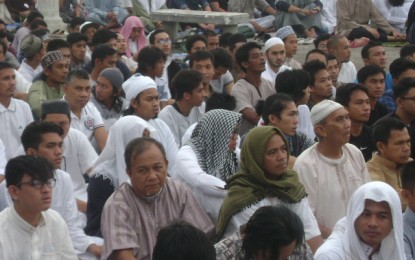
Zamboanga City – Families left homeless in the recent fires in Zamboanga City and Jolo, Sulu received some 4,478 food packs from the Filipino-Turkish Tolerance School on Tuesday and Wednesday, in celebration of Eid’l Adha or the Islamic Feast of Holy Sacrifice.
School director Ismail Kullap said each pack included at least one kilo of beef apportioned from the 85 cows slaughtered on Tuesday and Wednesday by his school in Zamboanga City. The food packs also contained rice and other commodities.
"This is the 21st year our school is annually holding this slaughter of cows to mark Eidl Adha," Kullap said.
Through the years, he said, most of the beef are shared with the poor while smaller portions are given to friends and school alumni.
Kullap said the cost of purchasing the cows and food items this year came from donations given by German businessmen. Last year, an Australian humanitarian foundation sponsored the activity.
Eid’l Adha is one of the two holiest Islamic feasts celebrated by Muslims around the world. It commemorates Prophet Abraham's sacrifice of his son as an act of obedience to God’s command. At the last moment, God asked Abraham to abort the sacrifice of his son and instead produced a ram for the divine offering and worship.
Zamboanga City Indigenous People's Council of Elders president, Ali Yacub, said Prophet Mohammad rededicated the event and renewed the observance of the holy sacrifice during his lifetime.
In his Eid’l Adha message to Zamboanga's Muslims and other residents, Yacub called on Muslims, Christians, and indigenous peoples “to dwell on our unity and our healing as victims of the 2013 Zamboanga siege, which is not easy but will surely come in time.”



“With the signing by President Duterte of the Bangsamoro Oranic Law, we see not only windows of opportunity but also doors of peace opening in Mindanao. I have called on the Moro Islamic Liberation Front not just to implement normalization but also healing. And so I call on city residents to live in inter-religious solidarity. We have one same father, the Prophet Abraham,” he added.
Yacuba said local Muslims who can afford the cost also slaughtered cows to mark the feast, and distributed the meat to relatives, friends, neighbors and the poor, whether Muslims or Christians.
Thousands of local Muslims attended congregational prayers at mosques and open areas including roadsides to say their Eid’l Adha prayers before 7 a.m. on Tuesday.
Thirteen of the 85 cows of the Turkish School were sacrificed in Barangay Taluksangay, the oldest Muslim village in the city, and the meats were distributed to its Muslim residents.
The ritual was supervised by the village's headman, former city councilor Abdurahman Nuno.
The Philippine Air Force, meanwhile, airlifted more than a thousand food packages to Jolo for the recent fire victims there, where the distribution was supervised by the local government.
The Turkish school held a short program at the school grounds on Tuesday noon which was attended by heads of the city government's departments and other government agencies, some businessmen and security officials. The program kicked off with the distribution of the food packages.
The beneficiaries included fire victims of Barangays Kasanyangan and Labuan in Zamboanga.
President Rodrigo Duterte earlier visited the Labuan and Jolo fire victims and extended to them monetary and relief assistance.
Compared to previous years where the slaughter of the cows was conducted in the Turkish school grounds, this year, it took place at the city government's modern abattoir.
Kullap said the work was faster because the abattoir is highly mechanized, ensuring the halal quality of the meat since the slaughter was in a section exclusively reserved solely for cows.
He said the city mayor charged a minimal fee for the abattoir service. (Rey-Luis Banagudos/PNA)
